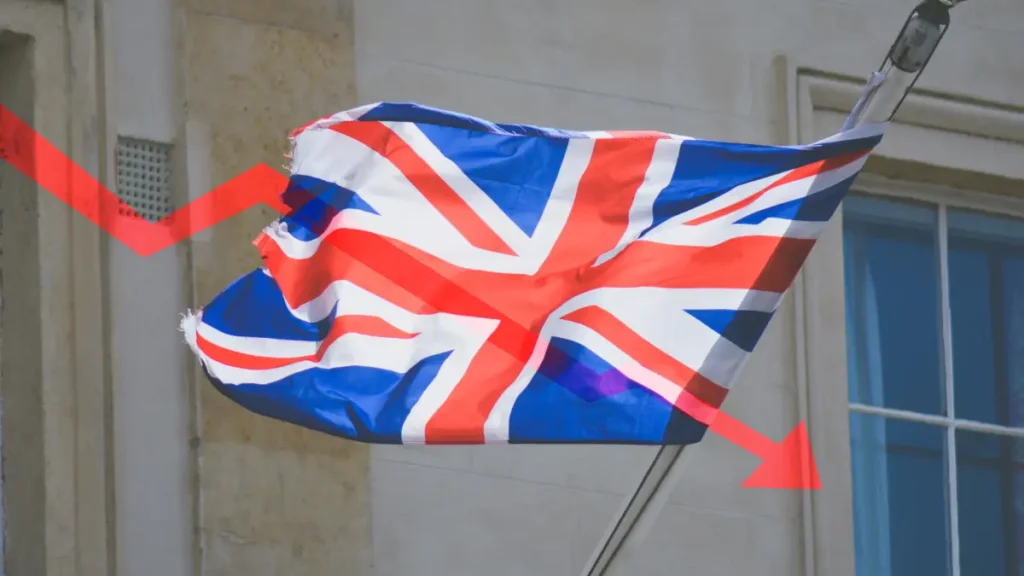In November, the UK experienced a greater-than-anticipated decrease in inflation, reaching 3.9%.
Economists, surveyed by Reuters, had predicted a slight drop to 4.4% in the headline consumer price index.
The October figure of 4.6%, already surprising by falling to a two-year low, set the stage for this unexpected decline.
This UK inflation slide marked the lowest annual reading since September 2021.
UK Inflation Slide Fuels Speculations
In a monthly comparison, the headline Consumer Price Index (CPI) saw a 0.2% decrease, contrary to the expected 0.1% increase. Additionally, the Core CPI, excluding the influence of volatile elements like food, energy, alcohol, and tobacco, registered an annual rate of 5.1%, significantly lower than the forecasted 5.6%.
According to the Office for National Statistics, the most significant UK inflation slide was attributed to transport, recreation, and culture, as well as food and non-alcoholic beverages.
The unexpectedly substantial UK inflation slide triggered increased speculation that the Bank of England will likely reduce interest rates in 2024. This speculation led to a significant drop in British bond yields.
The UK 10-year gilt yield reached an eight-month low, decreasing by 11 basis points to approximately 3.54%. Remember, yields move opposite to prices.
Simultaneously, among major European stock indices on Wednesday, the UK’s FTSE 100 was the sole one showing positive movement, rising by 0.8% during mid-morning trade.
UK Eyes Sustainable Growth
Last week, the Bank of England maintained a hawkish stance by keeping its primary interest rate steady at 5.25%. The Monetary Policy Committee emphasized that the policy is expected to remain restrictive for an extended duration.
In September, the central bank concluded a streak of 14 consecutive interest rate hikes, aiming to bring down inflation towards the Bank’s 2% target from a peak of 11.1% in October 2022.
UK Finance Minister Jeremy Hunt welcomed the figures on Wednesday, expressing optimism that the country is “beginning to alleviate inflationary pressures from the economy.”
In a statement, Hunt remarked,
“Coupled with the business tax cuts revealed in the Autumn Statement, this signifies a return to robust and sustainable growth.”
However, he acknowledged that numerous families are still grappling with elevated prices, emphasizing the ongoing commitment to prioritize measures addressing the pressures of the cost of living.
Bank of England Resists Rate Cuts Despite Market Expectations
Despite market expectations for substantial interest rate cuts in 2024, the Bank of England has consistently resisted, highlighting that “key indicators of UK inflation persistence remain elevated.”
Suren Thiru, economics director at ICAEW, characterized Wednesday’s “startling” inflation drop as reassuring for households, suggesting a “light at the end of the tunnel.” The easing core CPI figures indicate a relaxation of underlying price pressures.
Anticipating a potential strain on wages due to increasing unemployment and a sluggish economy, he explained via email that this factor is expected to contribute to the ongoing downward trajectory of wages.
The inflation figures imply that the Bank of England may be overly pessimistic in its discussions about when interest rates might decline.
If the economy continues to weaken and inflationary pressures persistently ease, the Bank could possibly initiate a policy loosening by the Autumn.
Inflation Data Spurs Cautious Optimism Amidst Economic Challenges
Richard Carter, head of fixed interest research at Quilter Cheviot, remarked that the recent inflation data contributes to a feeling of “cautious optimism” in the UK, especially compared to the cost of living challenges and bond market turbulence experienced last year.
Even with the decline in the Consumer Price Index (CPI), he pointed out that the overall economic situation remains “complex, marred by stagnation and subdued growth prospects.” The UK economy saw a 0.3% month-on-month contraction in October, following a period of stagnation in the third quarter.
Describing the economic stagnation that has kept output at January levels, Carter conveyed via email that it depicts an economy grappling with unprecedented challenges.
However, he acknowledged that the deceleration in inflation provides a “glimmer of relief” for households.
Various pressures, including the cost of living crisis, volatile energy markets, Brexit aftershocks, and persistent productivity issues, have combined to diminish economic prospects and consumer confidence.

